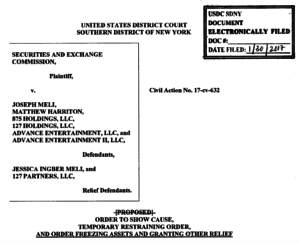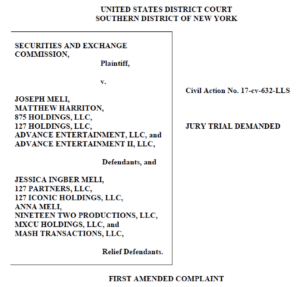Types Of SEC Cases: Ponzi Scheme Fraud
SEC Goes After $150 Million Ticket Resale Ponzi Scheme Fraud
The SEC brought charges against Joseph Meli, Matthew Harriton, and companies they were connected with, on the basis that they were running a Ponzi scheme fraud. According to the SEC, the defendants raised $97 million from at least 138 investors in 17 states, under the guise that the money was being invested into businesses with the purpose of purchasing and reselling tickets to highly in-demand live theater and concert events.
The Temporary Restraining Order and Asset Freeze
The Amended Complaint Expanded The Scope Of The Charges In The Ponzi Scheme Fraud
Subsequently, the SEC amended its court complaint to increase the amount involved in the Ponzi scheme fraud to $150 million. In addition to naming five additional relief defendants, the SEC also expanded the scope of its fraud case against the two individuals it originally charged with orchestrating the plan.
The Amended Complaint
Investor Funds Used To Perpetuate Ponzi Scheme Fraud And Enrich Fraudsters
As described in the Amended Complaint, Meli and Harriton used $59 million that they received from new investors to pay prior investors. Millions more were purportedly diverted to enrich Meli and Harriton. Among other things, the SEC alleged that Harriton was paid $1.3 million and Meli withdrew $1.5 million from corporate bank accounts for their own personal use. Meli also supposedly used the corporate bank accounts to fund personal expenses such as retail purchases, school and camp tuitions, casino expanses, travel, payments to professional services firms, and other things, totaling $6.8 million. In its original court complaint, the SEC had previously named Meli’s wife and one of his companies as relief defendants. In its Amended Complaint, the SEC also named Meli’s mother, two of his companies, and two companies owned by Harriton, as relief defendants because they allegedly received investor funds from the Ponzi scheme fraud. Together, the SEC alleges that the seven relief defendants obtained over $2.5 million of investor monies, in addition to $3 million of investor funds used to purchase a home in Meli’s wife’s name.
The SEC’s press release
Whistleblowers Can Report A Ponzi Scheme Fraud To The SEC
This case illustrates some types of misconduct that could give rise to SEC whistleblower cases if reported to the Commission through the SEC whistleblower program. However, the SEC has not made any public statement as to whether this case was itself an actual SEC whistleblower case. The SEC Office of the Whistleblower posts Notices of Covered Action (“NoCA”) for Commission actions where a final judgment or order results in monetary sanctions exceeding $1 million. The NoCA list does not disclose if a particular Enforcement action was brought as the result of an SEC whistleblower case, tip, complaint, or referral being filed with the Commission.Additional Information
For more information about Ponzi scheme fraud, click on the links below:- The Temporary Restraining Order. (External link to the SEC’s website.)
- The SEC’s Amended Complaint in SEC v. Meli, et al. (External link to the SEC’s website.)
- The SEC’s Press Release announcing the amended complaint. (External link to the SEC’s website.)







